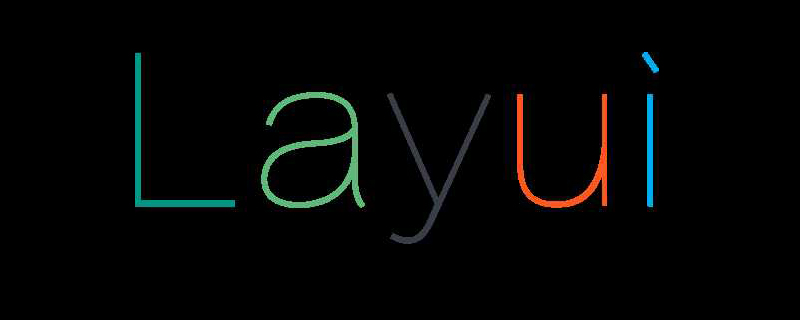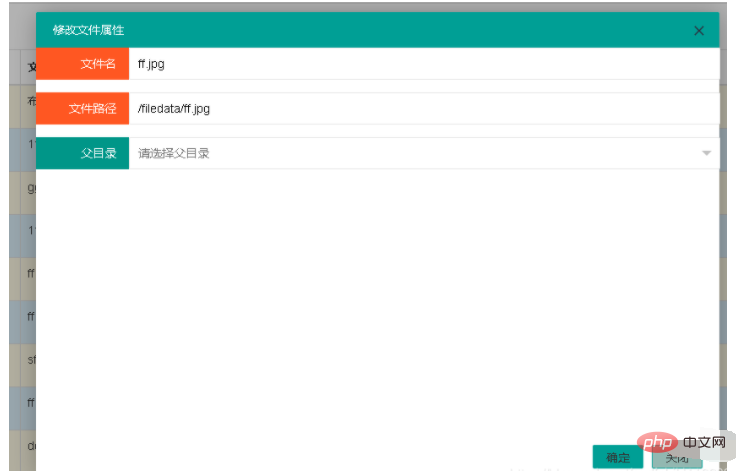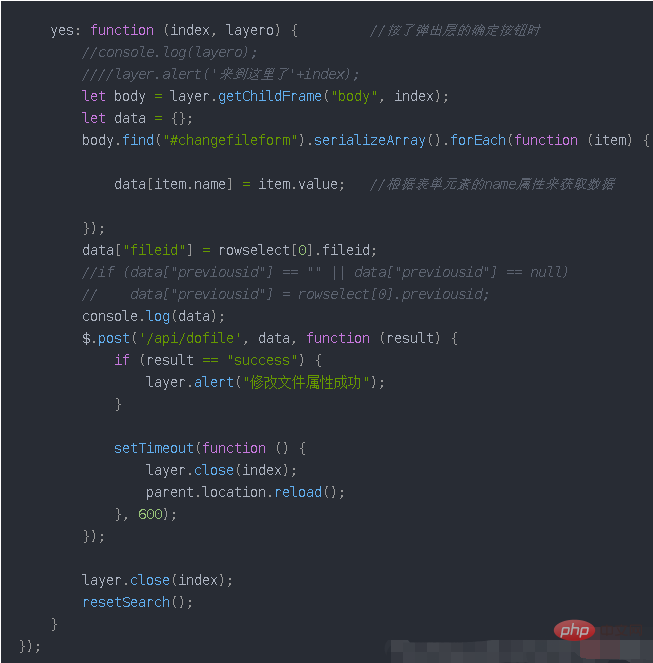How to pass value in layui popup layer
The implementation method of passing value in layui pop-up layer: 1. Pass the value from the main window to the pop-up layer; 2. Pass the value from the pop-up layer to the main window; 3. Transfer each other through session; 4. By calling the parent window function to obtain the value of the parent window.

The operating environment of this tutorial: Windows 7 system, layui version 1.0. This method is suitable for all brands of computers.
Recommended: "javascript basic tutorial""layUI tutorial"
There are mainly two parts
Pass the value from the main window to the pop-up layer
Pass the value from the pop-up layer to the main window
Interaction through session Pass
Get the value of the parent window by calling the function of the parent window (the opposite is also possible)
1. From The main window passes the value to the pop-up layer
The first is the js
changefileone function when the button is bound to the event. After the button is clicked, this function is called and the pop-up layer pops up, loading the changefile.html interface
Then success loads the form data of changefile in advance (pass the value from the main window to the pop-up layer)
//bootstraptable的修改,点击按钮的时候自动选中该行,因此可以获取到整行的值
function changefileone() {
var rowselect = $("#menuTable").bootstrapTable('getSelections'); //取得当前选定的selectItem对象,其中包括整行值
console.log(rowselect);
layer.open({
title: "修改文件属性",
type: 2,
content: "changefile.html",
area: ['50%', '70%'],
skin: "layui-layer-molv",
btn: ['确定', '关闭'],
success: function (layero, index) { //成功获得加载changefile.html时,预先加载,将值从父窗口传到 子窗口
//// console.log(obj.data.editAble);
let body = layer.getChildFrame('body', index);
//console.log(rowselect[0].filename);
body.find(".filename").val(rowselect[0].filename); //通过class名进行获取数据
body.find(".filepath").val(rowselect[0].path);//意思是将rowselect[0].path这个值传递到子窗口的class="filepath"这个的文本框中,(预先加载)
//body.find(".menuid").val(rowselect[0].previousid);
layui.form.render();
},
yes: function (index, layero) { //按了弹出层的确定按钮时,这是将在父窗口中获取子窗口form标签里的所有值,并根据name名和值形成键值对json对象
//console.log(layero);
////layer.alert('来到这里了'+index);
let body = layer.getChildFrame("body", index);
let data = {};
body.find("#changefileform").serializeArray().forEach(function (item) { //获取弹出层写下的数据,input,下拉框啊,之类的表单元素(即changefileform下的所有数据)
data[item.name] = item.value; //根据表单元素的name属性来获取数据
});
data["fileid"] = rowselect[0].fileid;
//if (data["previousid"] == "" || data["previousid"] == null)
// data["previousid"] = rowselect[0].previousid;
console.log(data);
$.post('/api/dofile', data, function (result) {
if (result == "success") {
layer.alert("修改文件属性成功");
}
setTimeout(function () {
layer.close(index);
parent.location.reload();
}, 600);
});
layer.close(index);
resetSearch();
}
});
}After clicking the button, load in advance

Then there is the html interface. The script is used to load database data in the drop-down box. You can delete
<!DOCTYPE html>
<html xmlns="http://www.w3.org/1999/xhtml">
<head>
<meta http-equiv="Content-Type" content="text/html; charset=utf-8"/>
<title></title>
<script src="/Scripts/jquery/jquery.min.js" type="text/javascript"></script>
<script src="/Scripts/layer/layer.js" type="text/javascript"></script>
<script src="/Scripts/layui/layui.all.js" type="text/javascript"></script>
<link rel="stylesheet" href="/Scripts/layui/css/layui.css" />
<script type="text/javascript">
$(document).ready(function () {
var selectvalue = ""; //定义这个用来存放选择的value
layui.use('form', function () {
var form = layui.form;
$.get("/api/choosemenu", function (data) {
for (var j in data.rows) {
//alert(data.rows[j].Name);
$("#menuname").append("<option value='" + data.rows[j].menuid + "'>" + data.rows[j].Name + "</option>");
}
form.render();
form.on('select', function (data) {
//alert(data.value);
//console.log(data.value);
selectvalue = data.value;
console.log(selectvalue);
});
})
})
})
</script>
</head>
<body>
<form class="layui-form" id="changefileform">
<!-- 提示:如果你不想用form,你可以换成div等任何一个普通元素 -->
<div class="layui-form-item">
<label class="layui-form-label layui-bg-red layui-center">文件名</label>
<div class="layui-input-block">
<input type="text" name="filename" placeholder="请输入" autocomplete="off" class="layui-input filename">
</div>
</div>
<div class="layui-form-item">
<label class="layui-form-label layui-bg-red layui-center">文件路径</label>
<div class="layui-input-block">
<input type="text" name="filepath" placeholder="请输入" autocomplete="off" class="layui-input filepath">
</div>
</div>
<div class="layui-form-item">
<label class="layui-form-label layui-bg-green layui-center">父目录</label>
<div class="layui-input-block">
<select name="previousid" id="menuname" lay-search>
<option value="" style="width:50px" class="menuid">请选择父目录</option>
</select>
</div>
</div>
</form>
</body>
</html>2. Then fill in the data in the pop-up layer and press OK to start loading the js. This Obtaining data is obtained through the name attribute. The above one is obtained through the class name.

Then if the controller obtains the data transmitted from js, see my other article Blog
The drop-down box dynamically obtains database data
The drop-down box can be searched
See my other blogs
3. Pass values through session
Set session
sessionStorage.setItem('roleid', 'hello');
Get session
var ss=sessionStorage.getItem('roleid');
Delete the specified value saved in the session
sessionStorage.removeItem('roleid');
Delete all
sessionStorage.clear();
4. By calling the function of the parent window Thus, the value of the parent window is obtained. This is suitable for obtaining a small number of values. The js of the parent window:
(1) (this is to obtain the selected value of bootstraptable) menuTable is the id of the table, so the returned value is jSON The value is
function getrowselect() {
return $.map($('#menuTable').bootstrapTable('getSelections'), function (row) {
return row//返回数据行
});
}(2) If it is an ordinary text text box (js of the parent window)
function getrowselect() {
return $.map($('#text').val(), function (row) {
return row//返回数据行
});}(3) It can also be directly in the js of the child window
window.parent.getElementById("text").val();If it is (1)(2), the sub-window js is called like this (this is connected to (1) (2), don’t get it wrong):
var rowselect = window.parent.getrowselect(); console.log(rowselect);//这里可以打印一下获取到值没有
5. If the sub-window passes the value to Parent window
Parent window js:
function getrowselect(userdata) {
console.log(userdata);
document.getElementById(userdata.inputid).value = userdata.uname;
var dffff = "id" + userdata.inputid;
document.getElementById(dffff).value=userdata.uid;
return;
}Child window:
//data="";
//data={"ss"="hello","gg"="world"}
window.parent.getrowselect(data);6. If the bullet window window wants to be larger than the parent window, you need to use top.layer. open or parent.layer.open
then pass
var iframeWin = window[layero.find('iframe')[0]['name']]; //得到iframe页的窗口对象,执行iframe页的方法:iframeWin.method();
The above is the detailed content of How to pass value in layui popup layer. For more information, please follow other related articles on the PHP Chinese website!

Hot AI Tools

Undresser.AI Undress
AI-powered app for creating realistic nude photos

AI Clothes Remover
Online AI tool for removing clothes from photos.

Undress AI Tool
Undress images for free

Clothoff.io
AI clothes remover

Video Face Swap
Swap faces in any video effortlessly with our completely free AI face swap tool!

Hot Article

Hot Tools

Notepad++7.3.1
Easy-to-use and free code editor

SublimeText3 Chinese version
Chinese version, very easy to use

Zend Studio 13.0.1
Powerful PHP integrated development environment

Dreamweaver CS6
Visual web development tools

SublimeText3 Mac version
God-level code editing software (SublimeText3)

Hot Topics
 1387
1387
 52
52
 How to set up jump on layui login page
Apr 04, 2024 am 03:12 AM
How to set up jump on layui login page
Apr 04, 2024 am 03:12 AM
Layui login page jump setting steps: Add jump code: Add judgment in the login form submit button click event, and jump to the specified page through window.location.href after successful login. Modify the form configuration: add a hidden input field to the form element of lay-filter="login", with the name "redirect" and the value being the target page address.
 How to get form data in layui
Apr 04, 2024 am 03:39 AM
How to get form data in layui
Apr 04, 2024 am 03:39 AM
layui provides a variety of methods for obtaining form data, including directly obtaining all field data of the form, obtaining the value of a single form element, using the formAPI.getVal() method to obtain the specified field value, serializing the form data and using it as an AJAX request parameter, and listening Form submission event gets data.
 How layui implements self-adaptation
Apr 26, 2024 am 03:00 AM
How layui implements self-adaptation
Apr 26, 2024 am 03:00 AM
Adaptive layout can be achieved by using the responsive layout function of the layui framework. The steps include: referencing the layui framework. Define an adaptive layout container and set the layui-container class. Use responsive breakpoints (xs/sm/md/lg) to hide elements under specific breakpoints. Specify element width using the grid system (layui-col-). Create spacing via offset (layui-offset-). Use responsive utilities (layui-invisible/show/block/inline) to control the visibility of elements and how they appear.
 How to transfer data in layui
Apr 26, 2024 am 03:39 AM
How to transfer data in layui
Apr 26, 2024 am 03:39 AM
The method of using layui to transmit data is as follows: Use Ajax: Create the request object, set the request parameters (URL, method, data), and process the response. Use built-in methods: Simplify data transfer using built-in methods such as $.post, $.get, $.postJSON, or $.getJSON.
 What is the difference between layui and vue?
Apr 04, 2024 am 03:54 AM
What is the difference between layui and vue?
Apr 04, 2024 am 03:54 AM
The difference between layui and Vue is mainly reflected in functions and concerns. Layui focuses on rapid development of UI elements and provides prefabricated components to simplify page construction; Vue is a full-stack framework that focuses on data binding, component development and state management, and is more suitable for building complex applications. Layui is easy to learn and suitable for quickly building pages; Vue has a steep learning curve but helps build scalable and easy-to-maintain applications. Depending on the project needs and developer skill level, the appropriate framework can be selected.
 What does layui mean?
Apr 04, 2024 am 04:33 AM
What does layui mean?
Apr 04, 2024 am 04:33 AM
layui is a front-end UI framework that provides a wealth of UI components, tools and functions to help developers quickly build modern, responsive and interactive web applications. Its features include: flexible and lightweight, modular design, rich components, Powerful tools and easy customization. It is widely used in the development of various web applications, including management systems, e-commerce platforms, content management systems, social networks and mobile applications.
 What language is layui framework?
Apr 04, 2024 am 04:39 AM
What language is layui framework?
Apr 04, 2024 am 04:39 AM
The layui framework is a JavaScript-based front-end framework that provides a set of easy-to-use UI components and tools to help developers quickly build responsive web applications. Its features include: modular, lightweight, responsive, and has complete documentation and community support. layui is widely used in the development of management backend systems, e-commerce websites, and mobile applications. The advantages are quick start-up, improved efficiency, and easy maintenance. The disadvantages are poor customization and slow technology updates.
 The difference between layui framework and vue framework
Apr 26, 2024 am 01:27 AM
The difference between layui framework and vue framework
Apr 26, 2024 am 01:27 AM
layui and vue are front-end frameworks. layui is a lightweight library that provides UI components and tools; vue is a comprehensive framework that provides UI components, state management, data binding, routing and other functions. layui is based on a modular architecture, and vue is based on a componentized architecture. layui has a smaller ecosystem, vue has a large and active ecosystem. The learning curve of layui is low, and the learning curve of vue is steep. Layui is suitable for small projects and rapid development of UI components, while vue is suitable for large projects and scenarios that require rich functions.




